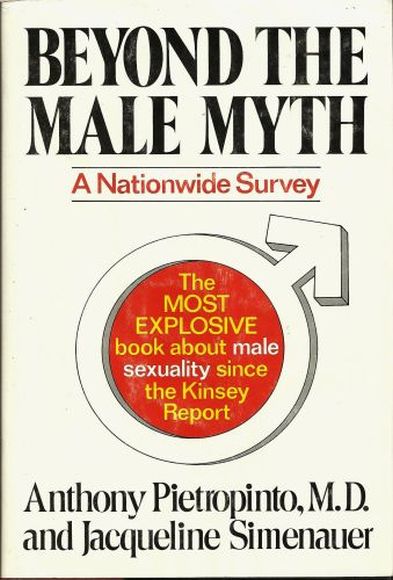

| BEYOND THE MALE MYTH What Women Want To Know About Men's Sexuality Anthony Pietropinto, M.D. Jacqueline Simenauer New York: Times Books, 1977 |
Rating: 5.0 High |
|||
| ISBN-13 978-0-8129-0726-1 | ||||
| ISBN 0-8129-0726-4 | ?p. | HC | $? | |
To find out "What Women Want To Know", the authors developed a survey composed of multiple-choice and essay questions, and circulated copies to thousands of randomly chosen men throughout the U.S. The objective was to avoid the biases and non-representative sample populations found in other studies then current — including the ground-breaking Kinsey Report of 20 years before — thus presenting a true picture of men's attitudes. This book presents their analysis of the 4,066 returned questionnaires.
In general, their conclusions are that men are more open and flexible than the macho stereotype suggests. They are willing to experiment with unconventional sexual practices, and most welcome aggressiveness from their partners, at least occasionally. (Here, aggressiveness means that the woman sometimes initiates a sexual encounter or assumes the superior position; it is not meant to imply whips and chains and the rest of the "BDSM" scene.) Typically, men also express concern for the woman's enjoyment, and often extend lovemaking past their own release until she too achieves orgasm.
In the larger scheme of things, they tend to rate love, companionship, and the security of a good home life at least as highly as a good time in bed. (Though, it is true, this is more common in older men.) And most are amenable to sharing responsibility for birth control and "safe sex".
The book, then, shatters the stereotype so often espoused by a certain segment of the feminist movement: namely that men are concerned for women only as objects of lust, and that even in that area they don't do a very good job as far as the woman is concerned. Along the way, the authors thoroughly debunk the work of Shere Hite1 (for whom it seems they have but little respect.) Both are, IMHO, valuable services. It does no one any good in the end if, in order to redress the very real wrongs done to women by some men's obdurate paternalism, feminism turns the tables and puts them in the position of the inferior sex.
Quotations from George Bernard Shaw's Man and Superman enliven the text. The authors draw on this and other works of literature, as well as such elements of popular culture as comic books and TV shows, to illuminate their points. To me, at times, this reliance on popular culture seems a bit overdone. But I can easily overlook that, for this is a thoroughly researched piece of scholarship and a very useful examination of the human condition.

 To contact Chris Winter, send email to this address.
To contact Chris Winter, send email to this address.